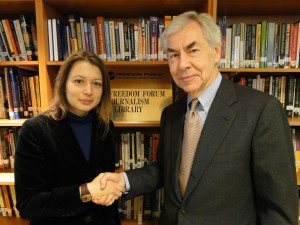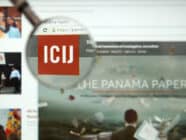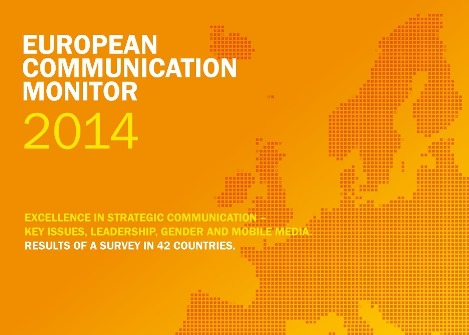
Inga Springe, Director of the Baltic Investigative Reporting Center & Ints Silins of the U.S. Baltic Foundation
Inga Springe sits down with Liga Ozolina of the EJO’s Latvian team to discuss the Baltic Investigative Reporting Center.
On August 9, 2011, a group of journalists from Lithuania, Estonia, and the United States announced the creation of the first-ever Baltic Investigative Reporting Center, a non-profit organization based in Riga, Latvia, designed to preserve the integrity of investigative journalism. The announcement came as a breath of fresh air for those resigned to the fact that investigative journalism is an endangered discipline in the Baltics.
Inga Springe, who is director of the center in addition to working as a journalist and lecturer at the University of Latvia, discusses the institute’s development and ambitions with the EJO’s Latvian Editor, Liga Ozolina.
Q: Where did you get the idea for the creation of the Baltic Investigative Reporting Center?
The idea came from the United States, where investigative journalism is mainly held within similar nonprofit organizations. One year ago, through the Fulbright/Humphrey Fellowship Program, I was given the opportunity to improve my professional skills in the United States. By that time I had resigned from my job at one of the largest daily newspapers in Latvia, Diena. While I didn’t know what my future held, I knew I didn’t want to work at a weekly magazine or for a daily newspaper anymore. At the same time I knew I couldn’t leave journalism completely. I was in the U.S. when some former colleagues came up with the idea to establish a nonprofit media center in Latvia. I decided to research the idea by attending conferences and reviewing the practices of The Washington Post and one of the oldest and largest non-profit investigative news organizations, The Center for Public Integrity, in order to gain a better understanding of developing trends in investigative journalism.
I also visited some of the most important non-profit media organizations in the U.S., among them ProPublica, which has twice been awarded the Pulitzer Prize. I was fortunate enough to meet Kristine Rizga, a Latvian journalist who lived in the United States for 10 years and worked for several non-profit media projects. She provided me with a great deal of support by helping to edit my writing while also offering emotional encouragement. As I continued to meet more journalists considered to be experts in non-profit investigative journalism, I became immersed in the idea of creating a center. I began to realize that in times like these, when journalistic news is decreasing in scope and frequency, such centers are integral in order to support the discipline. So I said, “Let’s try it in Latvia!”
Q: What will this center do?
We have set two main goals for our center: (1) to hold cross-border investigations of socially important issues, with a focus on topics involving corruption, crime, finances, entrepreneurship, health and human rights, and (2) to think about new and interesting ways to present our results for an expansive audience. One of the ways the center would meet these goals is by introducing the practice of “reading experience” which would consist of interactive maps, charts, time lines, photos, videos, and special programs with the aim of providing readers with a deeper level of understanding regarding journalistic topics.
The center would also use the Internet and other social networks to expose crime and corruption, similar to an India-based website titled ipaidabribe.com, which features self-reports from citizens who post messages detailing where and to whom they’ve been bribed or offered to bribe others. One idea for our center would be to expose the prevailing problem of bicycle theft in Riga, the capital city of Latvia, by creating an online interactive map of the city that includes self-reports from various victims of bicycle theft in order to publicize the most dangerous areas of the city for cyclists.
Q: Why does the center include the entire Baltic region as opposed to just Latvia?
When I was writing the project proposal, I acknowledged that we wouldn’t receive funding if we were only going to work within the borders of Latvia. Latvia is too small. Funding is typically granted to projects that are innovative due to their cross-national nature. Also working within three Baltic States gave us the opportunity to conduct in-depth comparative research projects, which are more valuable for our audience.
Q: Do you agree with the statement that investigative journalism is dying?
I think that investigative journalism is dying simply because media outlets do not have the time and resources needed to promote and encourage investigative stories. While investigative journalism still exists in Latvia, most journalists tend to perform analytical journalism, rather than investigative.
In the United States, reporters have the freedom to choose story topics, whereas in Lithuania powerful political and business interests hamper journalists, which has resulted in the deterioration of investigative and analytical traditions. Unfortunately journalism in Lithuania now consists mostly of entertainment news and thinly veiled advertisements.
Q: Do you think people are interested enough in investigative journalism to appreciate the activities of your center?
I think it is like this: People won’t know what they’ll need until they get it. If we find interesting ways to share our research results with the public, people will appreciate it. We need to keep in mind that people want to receive information in a clear and friendly manner.
Q: How will you reach your audience?
Typically, non-profit media organizations reach their audience through other media outlets. We are going to perform research, create a story and provide our research to media organizations free of charge. We will not staff any full-time journalists; rather we will hire journalists working for existing media organizations when conducting an investigative project. Media organizations will then be rewarded for sharing their workforce by providing first rights to publish the research before other publications are given access.
In addition we will have an official Web page, which is scheduled to launch at the end of November (currently the center has a Facebook page). The Web site will function using four language versions – Latvian, Lithuanian, Estonian and English, and will be used as an instrument for crowd sourcing.
Q: You recently conducted an interview with Charles Lewis, the founder of The Center for Public Integrity, who explained that non-profit centers typically survive due in large part to private donations. Will your center function in a similar fashion?
Because we do not have the same type of donation traditions that exist in the United States, I am quite certain that we won’t survive exclusively on private donations. But I am not worrying about that so much. My experience in the field of NGOs has helped to enlighten me to different funding options for financial support.
Q: How will you ensure the sustainability of your center?
Last spring we received $29,000 in support from the U.S. State Department as well as $10,000 from the United States Baltic Foundation. The Latvian-based Soros Foundation also announced a 30,000 Euro donation to our center. With the help of this money we will be able to survive for the duration of our inaugural year. Over time, we plan to raise funds through a diverse mix of sources: 50 percent from foundations, 40 percent from individual donors, and 10 percent from selling content and conducting exclusive research projects.
But if I want to be sincere with you, I have to say that in the very beginning I was thinking a lot about the sustainability of this center, but now I am seeing it as an experiment. We will try our best and in the end, time will tell if our center is sustainable or not.
*See EJO’s Latvian site for the original interview.
Tags: Baltic Journalism, Inga Springe, Investigative Journalism, Latvian Journalism, Soros Foundation, The Baltic Investigative Reporting Center, The Center for Public Integrity














































